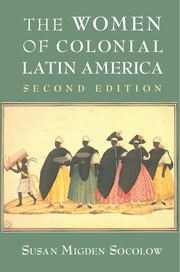Book contents
- Frontmatter
- Dedication
- Contents
- List of Figures
- Acknowledgments
- Introduction: Why Women?
- Chapter One Iberian Women in the Old World and the New
- Chapter Two Before Columbus: Women in Indigenous America and Africa
- Chapter Three Conquest and Colonization
- Chapter Four The Arrival of Iberian Women
- Chapter Five Women, Marriage, and Family
- Chapter Six Elite Women
- Chapter Seven The Brides of Christ and Other Religious Women
- Chapter Eight Women and Work
- Chapter Nine Women and Slavery
- Chapter Ten Women and Social Deviance
- Chapter Eleven Women and Enlightenment Reform
- Conclusion
- Documents
- Suggested Further Reading
- Index
- Plate section
- References
Chapter Eight - Women and Work
Published online by Cambridge University Press: 05 February 2015
- Frontmatter
- Dedication
- Contents
- List of Figures
- Acknowledgments
- Introduction: Why Women?
- Chapter One Iberian Women in the Old World and the New
- Chapter Two Before Columbus: Women in Indigenous America and Africa
- Chapter Three Conquest and Colonization
- Chapter Four The Arrival of Iberian Women
- Chapter Five Women, Marriage, and Family
- Chapter Six Elite Women
- Chapter Seven The Brides of Christ and Other Religious Women
- Chapter Eight Women and Work
- Chapter Nine Women and Slavery
- Chapter Ten Women and Social Deviance
- Chapter Eleven Women and Enlightenment Reform
- Conclusion
- Documents
- Suggested Further Reading
- Index
- Plate section
- References
Summary
The poor females perform all the drudgery, waiting upon [the men] with the greatest humility.
Colonial women were not only wives, concubines, spinsters, mothers, and nuns; they were also participants in the local colonial economy. Unfortunately, the place of women in the economy – as investors, consumers, and above all as a workforce – has tended to be ignored by historians. We are just beginning to understand the role played by women. This chapter will look at female participation in various sectors of the colonial economy, paying special attention to the importance of social class, ethnicity, and physical location in women’s economic pursuits.
Because of their number in colonial Latin America, an active economic role for women is not surprising. By the eighteenth century and possibly before, women were in the majority in virtually all the cities of colonial Latin America. For example, by 1778 in Córdoba, Argentina, 54.8 percent of the population was female; in late eighteenth-century São Paulo (1798), women accounted for 53.3 percent of the total; Quito also became increasingly female and by 1797 had only 53 men per 100 women.
The ratio of women to men differed by place and social or racial category, but from the seventeenth century on, women were in the majority in virtually every urban nonwhite group. In São Paulo, for example, women predominated in the free population (83.52 men for every 100 women), whereas in the slave population the sex ratio was almost equal (99.04 men for every 100 women). Among the casta population of Córdoba, there were only 71.3 men for every 100 women.
- Type
- Chapter
- Information
- The Women of Colonial Latin America , pp. 120 - 139Publisher: Cambridge University PressPrint publication year: 2015

